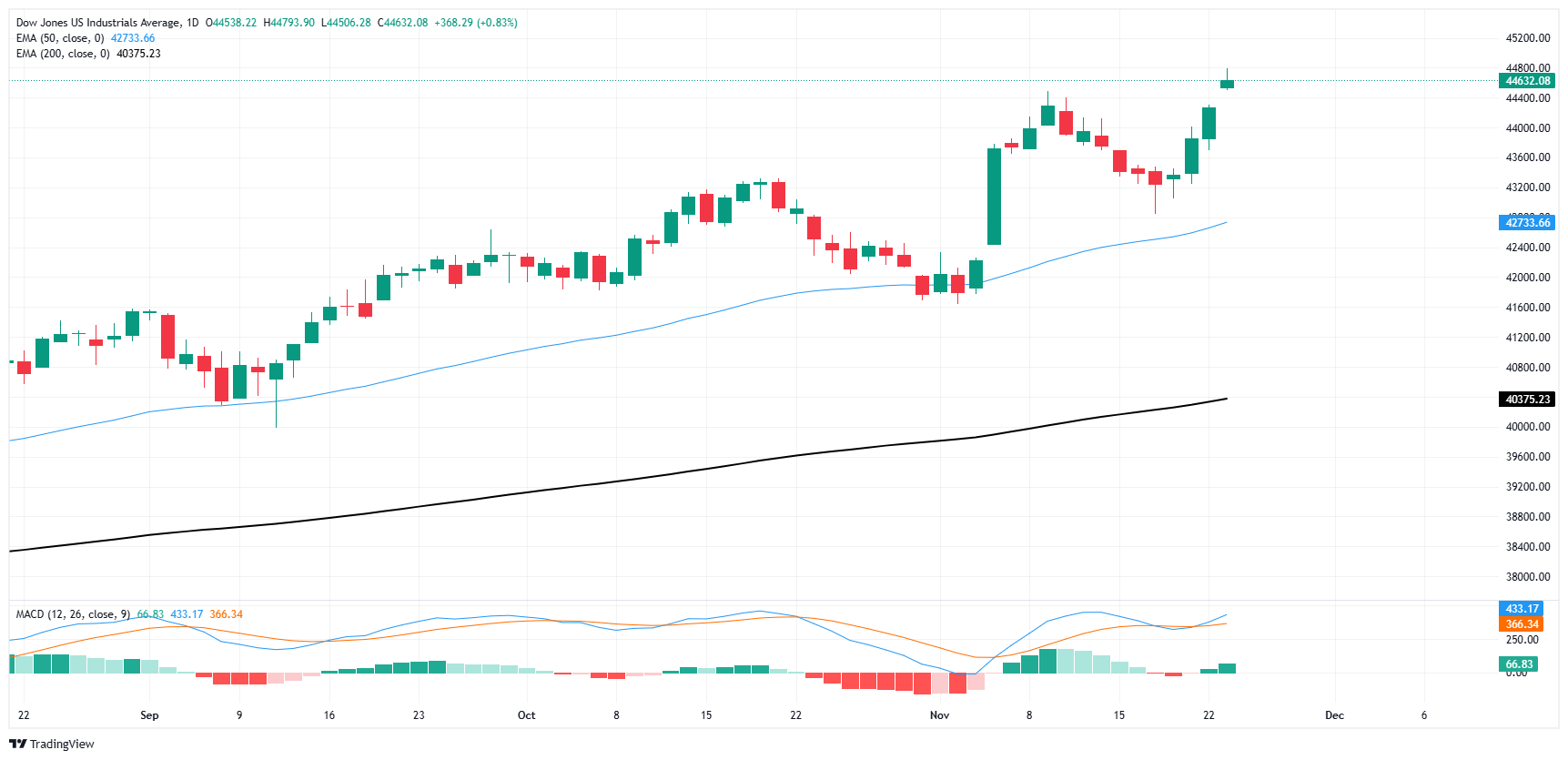- The Dow Jones hit a new all-time high bid just below 44,800 on Monday.
- Equity markets are turning broadly bullish after Trump signaled his pick for Treasury.
- Market rumors are swirling that Middle East peace talks could find a resolution soon.
The Dow Jones Industrial Average (DJIA) surged higher on Monday, starting the new trading week with a new all-time high just below the 44,800 zone. Investors pushed up stock prices on rumors that the ongoing conflict between Israel and Hezbollah in Lebanon could have a ceasefire deal on the table. Closer to home, investors became more bullish after President-elect Donald Trump picked Scott Bessent as his future Treasury secretary when he returns to the White House in January.
Even as U.S. officials lowered expectations and noted that a ceasefire deal has yet to be officially reached, markets remain optimistic that the geopolitical situation in the Middle East could stabilize by the end of this week. According to a post on parts in the coming days. Despite a general increase in investor sentiment over the prospect of easing instability in the Middle East, crude oil markets took a hit on the news, with West Texas Intermediate (WTI) crude oil US retreating almost 3% on Monday to $69 per barrel.
Investors stepped on the accelerator with the news that former President Donald Trump will choose Scott Bessent as his Treasury secretary. Scott Bessent is the founder of Key Square Group and a former partner at Soros Fund Management, making Bessent an odd choice for an incoming president who has routinely courted sectors of the electorate loaded with anti-Soros conspiracy theories.
Even as equity markets soared on the prospect of incoming President Donald Trump picking a hedge fund manager for a federal oversight position, a notably bullish appointment for the broader equity field, Former President Donald Trump’s record of making dubious personnel choices remains unchallenged: Keystone Group’s fund performance has a notoriously volatile history. According to Reuters reports, institutional investors have fled Keystone Groups in recent years, with the macro hedge fund peaking at more than $5 billion in assets under management (AUM) in late 2017 and falling to a 2024 minimum of just over $500 million. Although Keystone Group opened its doors with initial funding from Soros Capital, Soros has reportedly withdrawn all funding from Bennet’s fund and now has no exposure to the investment vehicle.
Dow Jones News
Despite a bid earlier in the week that hit a new all-time high, the Dow is settling into a more reasonable stance for Monday, still trading higher but pulling back from a record near 44,800. Two-thirds of the main equity index are finding gains on the day, with the remaining third stuck on the red side of the day’s opening line.
Nvidia (NVDA) missed Monday’s bullish push, falling another 3.3% and retreating to $137 per share as investors continue to rebalance their sky-high expectations from the chipmaker. Despite reporting annual revenue growth figures of more than 90% last week, bidders in the amorphous AI technology rally expected more, and are backing away from the prospect of Nvidia’s future revenue growth falling from the company’s forecast. 112% by 2025 to a comparatively slow 49% in 2026.
Dow Jones Price Forecast
Monday’s Dow Jones bid at a new all-time high near 44,800 has left the blue-chip index back on the high side of a short-term bull run, shaking off a recent slide lower long before technical indicators could form. bassists. The Dow Jones is up nearly 19% from bottom to top in 2024, and is up a staggering 32% since daily candlesticks last touched the 200-day exponential moving average (EMA) in November 2023 near the region of 33,800.
Dow Jones Daily Chart
The Dow Jones FAQs
The Dow Jones Industrial Average, one of the world’s oldest stock indices, is made up of the 30 most traded securities in the United States. The index is weighted by price rather than capitalization. It is calculated by adding the prices of the securities that comprise it and dividing them by a factor, currently 0.152. The index was founded by Charles Dow, also founder of the Wall Street Journal. In recent years it has been criticized for not being sufficiently representative, since it only follows 30 companies, unlike broader indices such as the S& P 500.
There are many factors that drive the Dow Jones Industrial Average (DJIA). The main one is the aggregate performance of its component companies, revealed in quarterly corporate earnings reports. US and global macroeconomic data also contribute, influencing investor sentiment. The level of interest rates, set by the Federal Reserve (Fed), also influences the DJIA, as it affects the cost of credit, on which many companies largely depend. Therefore, inflation can be a determining factor, as well as other parameters that influence the Federal Reserve’s decisions.
The Dow Theory is a method for identifying the main trend of the stock market developed by Charles Dow. A key step is to compare the direction of the Dow Jones Industrial Average (DJIA) and the Dow Jones Transportation Average (DJTA) and only follow trends where they are both moving in the same direction. Volume is a confirmation criterion. The theory uses elements of maximum and minimum analysis. The Dow theory proposes three phases of the trend: accumulation, when the smart money begins to buy or sell; public participation, when the general public joins the trend; and distribution, when the smart money abandons the trend.
There are several ways to trade the DJIA. One of them is to use ETFs that allow investors to trade the DJIA as a single security, instead of having to buy shares of the 30 companies that comprise it. A prominent example is the SPDR Dow Jones Industrial Average ETF (DIA). Futures contracts on the DJIA allow traders to speculate on the future value of the index, and options provide the right, but not the obligation, to buy or sell the index at a predetermined price in the future. Mutual funds allow investors to purchase a portion of a diversified portfolio of DJIA securities, providing exposure to the global index.
Source: Fx Street
I am Joshua Winder, a senior-level journalist and editor at World Stock Market. I specialize in covering news related to the stock market and economic trends. With more than 8 years of experience in this field, I have become an expert in financial reporting.







